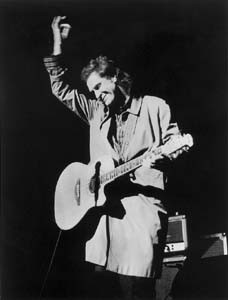Kinda Kinks
Michael Amsler
Ray Davies’ one-man show rolls into LBC
By Greg Cahill
RAY DAVIES sounds shagged. He’s midway through a hectic U.S. tour to perform The Storyteller at a series of one-night stands and to promote the just-released CD version of the acclaimed performing arts piece–a sometimes touching, often humorous one-man show in which the frontman for the Kinks tells of his early rock career while accompanying himself on solo acoustic guitar–and all the press attention clearly is taking its toll.
For this 54-year-old singer and songwriter, it’s almost like living the frenzied rock ‘n’ roll life.
“Actually, rock ‘n’ roll was easier going than this,” says a weary Davies from an Arizona hotel room, his sense of humor holding up after four phone interviews in two hours. “As I remember it, you’d just get out of your brain during the day and pull it together at night for the show.
“This thing I’m doing now, I have to be on at seven in the morning.”
Now on his third tour of the states with The Storyteller, Davies has racked up rave reviews. New York Times critic Neil Strauss has lauded the piece as “surprisingly intimate, honest, and well staged,” and marveled that Davies’ voice is still “capable of hitting the sweet high notes that can turn detailed observation into perfect pop.”
Like his contemporaries Paul McCartney of the Beatles and Pete Townshend of the Who, Davies–one of the most accomplished songwriters to emerge from the 1960s British rock invasion–has stretched out artistically in recent years. He has worked as a filmmaker, an actor, a theatrical writer and producer, a composer for musical theater, and an author.
The idea for the one-man show came while Davies was writing his autobiography, X-Ray (Overlook Press, 1994). “The book made me realize the links between my life as a musician–and even my life before I became a musician–and the subtext of what I’d been writing about all those years as a songwriter,” he says. “The lyrics uncannily paralleled things that were going on in my life, much more so when I was newer at it, because I was only writing about those things I knew about from direct experience. There was a sort of innocence and naiveté, but somehow it was very truthful to me.
“So it was logical that the story of the band and growing up in North London worked with some of the old songs.”
While many rockers express bitterness about their upbringings–complaining that their dysfunctional families fueled their angst-driven music–Davies’ recollections possess a sweet charm, a nostalgic look at a post-World War II society.
Nowhere does that sentimentality for the past–which permeates such classic Kinks social satires as The Village Green Preservation Society, and reflects the wistfulness of a declining empire– become more obvious than in Davies’ tales about the Front Room, the family parlor that provided shelter from the storm of societal changes sweeping across England in the early to mid-’60s.
“Once upon a time there was a room in our house called the Front Room,” he recounts in his autobiography. “It was so named because it was the front of the house, by the street. It was reserved for special occasions: Christmas parties, wedding receptions, birthdays, christenings, and funerals all took place in the Front Room. Important visitors were always shown into it… . People laughed, cried there. My sisters courted their boyfriends in there. Every special time and occasion was celebrated in the Front Room. The first time that I, Raymond Douglas, saw David Russell, my baby brother, was in the Front Room just after he had been born.”
THE REST, as they say, is musical history. Ray and Davey went on to form the nucleus of the Kinks. In the Front Room, Ray Davies first hammered out on the family piano the opening chords of the band’s first pop hit, “You Really Got Me,” and brother Davey set up his distortion-heavy guitar amp dubbed the Green Monster.
Within months, Ray Davies, then 19, and his bandmates were thrust into the international spotlight. Yet, Davies had no idea that he had crafted a sound that would reverberate for three decades. Now he’s regarded as the Godfather of Power Pop and a hero to a whole new generation of British and American rock bands influenced by the Kinks’ punkish garage rock. “I’m sure they all have their own varying heroes,” he laughs. “But it does seem that a lot of folks do like the Kinks and the songs I wrote for them.
“It’s interesting to look back at what very modest ambitions I had. At the time we recorded those songs, really, we just wanted to do well with them. But what an impact they had.”
Today, Ray Davies has little time to dwell on past glories, despite his retrospective show. “There are a few things on the boil,” he quips. “For the past two years, we’ve been working on a musical version of [the Kinks’ hit homage to 1950s dance palaces] ‘Come Dancing’–we’ve done the script, we’ve completed the first act with music, and we’re very pleased with that. So that could see the light of day next year,” he says. “I’m supposed to be writing a small orchestral piece for an arts festival in England in the fall.
“And I’m getting ready to go in to record my first solo studio album, which I’m really excited about.
Will he retire The Storyteller, now that it’s been recorded for posterity? “Well, it’s something of a work in progress,” he concludes. “It really only tells my life up until the recording of ‘You Really Got Me,’ so that’s less than half my career.
“There are always more stories to tell.”
Ray Davies performs The Storyteller on Friday, May 22, at 8 p.m. Luther Burbank Center for the Arts, 50 Mark West Springs Road, Santa Rosa. Tickets are $21.50. 546-3600.
From the May 14-20, 1998 issue of the Sonoma County Independent.
© Metro Publishing Inc.









